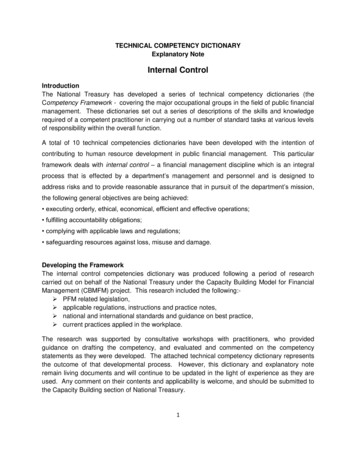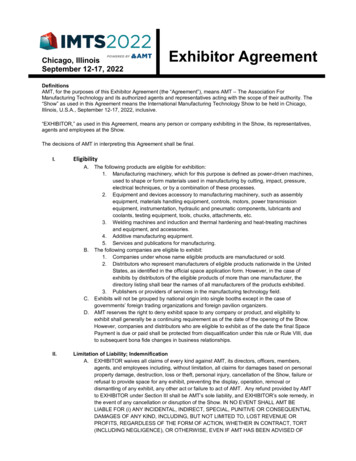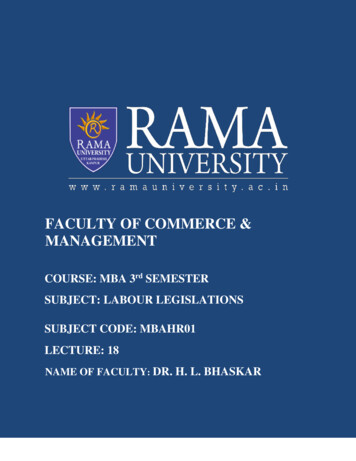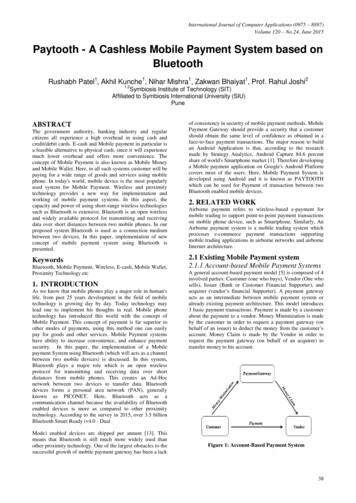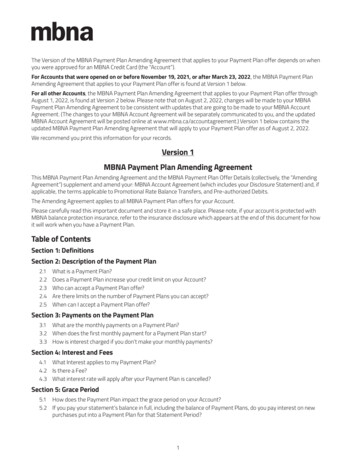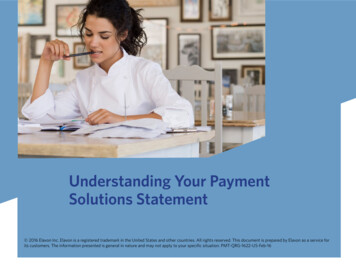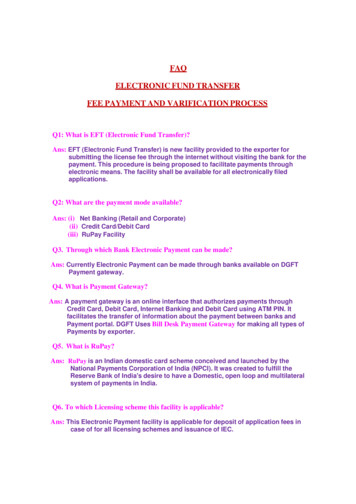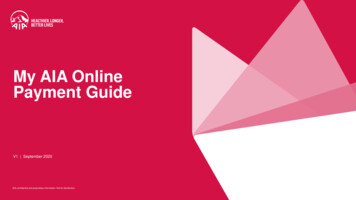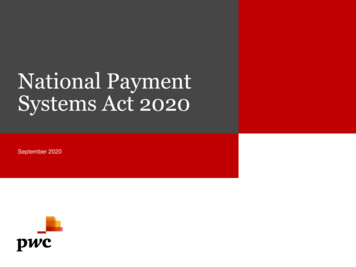
Transcription
National PaymentSystems Act 2020September 2020
Disclaimer 2020 PwC. All rights reserved. Not for further distribution without thepermission of PwC. “PwC” refers to the network of member firms ofPricewaterhouseCoopers International Limited (PwCIL), or, as thecontext requires, individual member firms of the PwC network. Eachmember firm is a separate legal entity and does not act as agent ofPwCIL or any other member firm. PwCIL does not provide any servicesto clients. PwCIL is not responsible or liable for the acts or omissions ofany of its member firms nor can it control the exercise of theirprofessional judgment or bind them in any way. No member firm isresponsible or liable for the acts or omissions of any other member firmnor can it control the exercise of another member firm’s professionaljudgment or bind another member firm or PwCIL in any way.PwCWebinar on National Payment Systems Act 2020Proprietary and confidential. Do not distribute.2
AgendaTimeActivity10:00 – 10:10Opening Remarks10:10 – 10:40Background and overview of the NPSA10:40 – 11:10Key provisions of the NPSA11:10 – 11:25Q&A11:25 – 11:30Closing RemarksPwCWebinar on National Payment Systems Act 2020Proprietary and confidential. Do not distribute.3
Opening RemarksPlaxeda NamirimuAssociate Director - TaxPwCWebinar on National Payment Systems Act 2020Proprietary and confidential. Do not distribute.
Background andoverview of theNPSADorothy UzamukundaManager – Tax and Legal Services
What to expectAgenda1.What are payment systems?2.The regulatory landscape before NPSA3.NPSA’s objective4.Closing remarksPwCWebinar on National Payment Systems Act 2020Proprietary and confidential. Do not distribute.6
What are payment systems?A payment system is defined under National Payment Systems Act (NPSA) to mean:“a system used to effect a transaction through the transfer of monetary value, andincludes the institutions, payment instructions, person, rules, procedures, standards,technologies that make the transfer possible”.A country’s National Payment System (NPS) therefore consists of the institutions(banks, financial institutions and non-financial institutions), the procedures andtechnology that is used to facilitate the circulation of money within the country andinternationally.PwCWebinar on National Payment Systems Act 2020Proprietary and confidential. Do not distribute.7
Payment systems currently operating inUgandaSource: Bank of UgandaPwCWebinar on National Payment Systems Act 2020KeyBlue: Those operated by BoURed: Commercial BanksGreen: Private SectorProprietary and confidential. Do not distribute.8
Payment services provided by PrivateSector E-money providers like Mobile moneytelecommunication companies Single purpose stored value cards E-commerce Aggregators/ integrators e.g. Payway,EzeeMoney Remittance companies like WesternUnion, World Remit, e.t.cPwCWebinar on National Payment Systems Act 2020Proprietary and confidential. Do not distribute.9
The regulatory landscape before NPSAThere are several pieces of legislation that are relevant to the regulation ofpayment systems. These include: The Bank of Uganda Act; The Financial Institutions Act (2016); The Electronic Transactions Act (2011) which governs the use, security,facilitation and regulation of electronic communications and transactions; Computer Misuse Act (2011) which makes provision for the safety and security ofelectronic transactions and information systems to prevent unlawful access,abuse or misuse; The Contracts Act (2010); The Electronic Signatures Act (2011) and Anti-Money Laundering Act (2013).PwCWebinar on National Payment Systems Act 2020Proprietary and confidential. Do not distribute.10
The regulatory landscape before NPSA Before NPSA, regulation of payment systems was mainly focused on financialinstitutions and hardly the non-financial institutions providing payment systems inthe financial sector. In 2013, the Bank of Uganda issued the Bank of Uganda (Mobile Money)Guidelines to address mobile money issues; by for example providing clarity,delineating the approval procedure for parties seeking to engage in the provisionof mobile money services, fostering consumer protection and more. In spite of the above, there remain complaints from mobile money users, forinstance, expedient recovery of mobile money when sent to a wrong number,what happens to the mobile funds when one dies and no one else knows theirPIN code e.t.cPwCWebinar on National Payment Systems Act 2020Proprietary and confidential. Do not distribute.11
The regulatory landscape before NPSAAll the above laws appear to givesome protection but do not addressconstraints to, or support, theoperation or future development of thepayment systems.Despite the infrastructuredevelopments and productinnovations, significant deficiencies'exist in the legal and regulatoryframework for these payments and theretail payment infrastructure.PwCWebinar on National Payment Systems Act 2020Proprietary and confidential. Do not distribute.12
Existing gaps in the regulation ofpayment systems before NPSA No comprehensive law that supports the National Payments System whichcreates risks with the operation of the system. Innovation and digitisation of payments by Fintechs which provide alternativechannels for payments without necessary regulation. For compliance to be enforced, there is need to have operating norms andregulations providing the acceptable operating norms and regulations. Consumer protection. Efficiency of systems – ensuring that payment systems are appropriate and meetthe needs of users. Need to broaden access, reduce cost and increase financial inclusion toelectronic payment services in Uganda.PwCWebinar on National Payment Systems Act 2020Proprietary and confidential. Do not distribute.13
According to BoUreports, althoughaccess to consumerpayments hasincreased due tomobile money,80% of paymentsin Uganda are stillperformed usingcash.Bank of Uganda ReportPwCProprietary and confidential. Do not distribute.14
The objective of NPSA is to:1. Ensure that all payment systems are brought into the realm of BoU regulation,supervision and oversight.2. Safety and efficiency of payment systems;3. Functions of the BoU in relation to payment systems;4. Prescribe the rules governing the oversight and protection of payment systems;5. Provide for financial collateral arrangements;6. Regulate payment service providers;7. Regulate issuance of electronic money;8. Provide for the oversight of payment instruments and9. Encourage innovation and foster development of new products and services.PwCWebinar on National Payment Systems Act 2020Proprietary and confidential. Do not distribute.15
Closing remarks A safe and efficient payment system helps to maintain financial stability bypreventing or containing systemic risks. BoU as the watchdog of the economy is interested in ensuring overalleffectiveness and integrity of the payment systems in the country. Financial inclusion will be achieved, as all users of financial products whetherthrough banks or otherwise are protected. BoU will be able to confirm the integrity of systems and financial products/services operating in the market. Increased customer confidence, including for innovators and developers as thereis a clear path to follow.PwCWebinar on National Payment Systems Act 2020Proprietary and confidential. Do not distribute.16
Key provisions of the NPSAHilda Kamugisha,Manager – Tax and Legal Services
Application of the ActWho does the Act apply to? Current operators with approval from BOU,e.g. mobile money companies, such asAfricell, Airtel, MTN and UTL. Other operators of payment systems, paymentservice providers, issuers of paymentinstruments, money issuers and aggregators,e.g. PayPal, Payway and EzeeMoney. Users of payment systems, retail stores andpoint of sale outlets, clearing houses and thebanks whose technologies and infrastructuremake the payments possible.PwCWebinar on National Payment Systems Act 2020Proprietary and confidential. Do not distribute.18
Key definitionsElectronic money: a monetaryvalue represented by a claim onthe issuer, which is: Stored on an electronic device; Issued upon receipt of funds inan amount not less in value thanthe monetary value received; Accepted as a means of paymentby undertakings other than theissuer; and Prepaid or redeemable in cash.19
Key definitionsPayment instrument:Any device or set of procedures bywhich a payment instruction isissued for purposes of makingpayments or transferring moneyand includes cheques, bills ofexchange, promissory notes,electronic money, credit transfers,direct debits, credit cards and debitcards or any other instrumentthrough which a person may makepayments, except banknotes andcoins.20
Key definitionsPayment service:Payment system: Services enabling cash A system used to effect adeposits or withdrawals; Execution of paymenttransactions; Issuance and acquisition ofpayment instruments; or Any other service incidental totransaction through the transferof monetary value, and includesthe institutions, paymentinstruments, person, rules,procedures, standards, andtechnologies that make such atransfer possible.the transfer of funds.21
LicensingGeneral licensing provisions The central bank has powers to modify, Any person who wishes to offer paymentrevoke or suspend the licence where aservices, establish or operate a paymentlicensee fails to meet the criteria set out insystem or issue payment instrumentsthe law.must apply to BoU for a licence. BOU will establish a regulatory sandbox Operating a payment system withoutframework for purposes of governing theobtaining the BoU licence is an offencemanner in which a person may obtainand a person who breaks this provisionlimited access to the payment systemwould be liable to a fine not exceedingecosystem to test financial products orUGX 40 million or imprisonment notservices without obtaining a licence underexceeding four years, for a corporate body the Act.a fine not exceeding UGX 140 million, BOU may appoint an external auditor toupon conviction.examine a service provider, participant oroperator of a payment system.PwCWebinar on National Payment Systems Act 2020Proprietary and confidential. Do not distribute.22
Licensing (Continued)Who is Eligible to be licensed? Payment system with the specifiedobjects (Section 8 of the Act) Payment system that is interoperablewith other payment systems in thecountry and internationally.Foreign participants The rights and obligations arising from, orin connection with, the participation of aforeign participant shall be governedexclusively by the laws of Uganda.PwCWebinar on National Payment Systems Act 2020Proprietary and confidential. Do not distribute.23
Licensing (Continued)Licensing Requirements An electronic money issuer must have an equivalent amount of cash deposited in atrust account or special account. Set up a subsidiary legal entity and obtain a licence for the purpose of operating thepayment system (i.e. the issuance of electronic money). Exception: entities solelyestablished to issue electronic money, a financial institution as regulated by BoU ormicrofinance deposit taking institution. Electronic money issuers such as telecoms will be required to establish andmaintain their primary data centre in relation to payment system services inUganda. BoU will prescribe different classes of licences.PwCWebinar on National Payment Systems Act 2020Proprietary and confidential. Do not distribute.24
Other Compliance RequirementsThe law contains other requirementsas follows: annual license fees on or before 31stJanuary every year develop payment system rulesgoverning the transfer of money submit annual reports to BOU retain payment system records for atleast 10 years and only destroy suchrecords upon approval by BOU protection of customer information,comply with consumer protectionrequirementsPwCWebinar on National Payment Systems Act 2020Proprietary and confidential. Do not distribute.25
Other Compliance Requirements(Continued)The law contains other requirementsas follows: maintain the minimum capital onceprescribed by BOU ensure availability of the paymentsystem during the operational period notify the BOU and publish anyintention to cease carrying on thebusiness funds on dormant electronic moneyaccounts may be claimed within sevenyears. All unclaimed funds will betransferred to BOU for deposit into theConsolidated Fund.PwCWebinar on National Payment Systems Act 2020Proprietary and confidential. Do not distribute.26
Conclusion:Prepare to comply with the NPSA .Regulators Engage with the various governmentstakeholders to ensure that all potentialrisks are managed to avoid disruptionto the business. Regulatory issues from both BOU andUCC’s perspective and the need forcoordination to ensure smoothtransition and split of the electronicmoney business.such as internal staff, business partners,dealers, suppliers, regulators, customers,etc. A workplan showing schedule ofevents that will happen, when, who isresponsible, whom it will affect.Other stakeholders Communicate with the variousstakeholders about the business split,PwCWebinar on National Payment Systems Act 2020Proprietary and confidential. Do not distribute.27
Prepare to comply with the NPSA .(Continued)Future operations Impact on the future companies’ day today operational issues – income split,cost allocation, resource allocation, therequired changes to the IT systems,financial reporting etc. Identify the institution where the trustaccount will be held and who thetrustees will be. For financialinstitutions providing electronic money,set up special account to hold thesubscribers’ funds. Simulation of what the future will looklike through segmental reporting byconfiguring the systems to be ready forthe business split. Costs of splitting the business,potential disruption to the businesses,mitigation measures against thedisruption. Day to day operational issues of thetwo companies – shared services,separate management and boards,staff transfer to the subsidiary, licenceand intellectual property issues, etc. Review existing information and cybersecurity systemsPwCWebinar on National Payment Systems Act 2020Proprietary and confidential. Do not distribute.28
Grey AreasThe following areas of the Act needfurther clarification: Application process and fees Minimum share capital Classes of licences Joint operations - who gets thelicence? Electronic money account types andthe transaction limits Implementation of the Act for foreignparticipants Regulatory sandbox Compliance with requirements bymultiple regulatorsPwCWebinar on National Payment Systems Act 2020Proprietary and confidential. Do not distribute.29
Q&ADerrick Lusiba,Associate – Tax and Legal Services
Closing RemarksPlaxeda NamirimuAssociate Director - TaxPwCWebinar on National Payment Systems Act 2020Proprietary and confidential. Do not distribute.
How we can assist PwC is a professional services firm,providing Assurance, Tax and Legalservices as well as advisory solutions tobusinesses.With regard to the new NPSA law, itsimplications for existing businesses andnew entrants in that space, we would behappy to assist with the following: Understanding the provisions of NPSAand its impact on your specificbusiness; Providing training that is tailored toyour business, creating awareness foryour staff on the impact of this new law; Accounting, tax and legalconsiderations to be taken into accountwhen restructuring your business tocomply with NPSA requirements; and Assessment of licensing requirementsand steps to be taken once theregulations have been issued. Ongoing compliance, developingcompliance checklists and supportingyour internal management teams inimplementing these obligations;PwCWebinar on National Payment Systems Act 2020Proprietary and confidential. Do not distribute.32
Get in touchPlaxeda NamirimuAssociated Director- Taxplaxeda.namirimu@pwc.com 256 772 486 965Dorothy UzamukundaManager- Taxdorothy.b.uzamukunda@pwc.com 256 756 860 862Hilda KamugishaManager- Taxhilda.kamugisha@pwc.com 256 777 012 211pwc.com 2020 PwC. All rights reserved. Not for further distribution without the permission of PwC. “PwC” refers to the network of member firms ofPricewaterhouseCoopers International Limited (PwCIL), or, as the context requires, individual member firms of the PwC network. Each memberfirm is a separate legal entity and does not act as agent of PwCIL or any other member firm. PwCIL does not provide any services to clients. PwCILis not responsible or liable for the acts or omissions of any of its member firms nor can it control the exercise of their professional judgment or bindthem in any way. No member firm is responsible or liable for the acts or omissions of any other member firm nor can it control the exercise ofanother member firm’s professional judgment or bind another member firm or PwCIL in any way.
PwC Webinar on National Payment Systems Act 2020 Proprietary and confidential. Do not distribute. Before NPSA, regulation of payment systems was mainly focused on financial institutions and hardly the non-financial institutions providing payment systems in the financial sector. In 2013, the Bank of Uganda issued the Bank of Uganda (Mobile Money)
